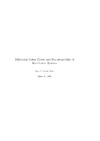This book is devoted to the relation between two different concepts of integrability: the complete integrability of complex analytical Hamiltonian systems and the integrability of complex analytical linear differential equations. For linear differential equations, integrability is made precise within the framework of differential Galois theory. The connection of these two integrability notions is given by the variational equation (i.e. linearized equation) along a particular integral curve of the Hamiltonian system. The underlying heuristic idea, which motivated the main results presented in this monograph, is that a necessary condition for the integrability of a Hamiltonian system is the integrability of the variational equation along any of its particular integral curves. This idea led to the algebraic non-integrability criteria for Hamiltonian systems. These criteria can be considered as generalizations of classical non-integrability results by Poincar? and Lyapunov, as well as more recent results by Ziglin and Yoshida. Thus, by means of the differential Galois theory it is not only possible to understand all these approaches in a unified way but also to improve them. Several important applications are also included: homogeneous potentials, Bianchi IX cosmological model, three-body problem, H?non-Heiles system, etc.
The book is based on the original joint research of the author with J.M. Peris, J.P. Ramis and C. Sim?, but an effort was made to present these achievements in their logical order rather than their historical one. The necessary background on differential Galois theory and Hamiltonian systems is included, and several new problems and conjectures which open new lines of research are proposed.
- - -
The book is an excellent introduction to non-integrability methods in Hamiltonian mechanics and brings the reader to the forefront of research in the area. The inclusion of a large number of worked-out examples, many of wide applied interest, is commendable. There are many historical references, and an extensive bibliography.
(Mathematical Reviews)
For readers already prepared in the two prerequisite subjects [differential Galois theory and Hamiltonian dynamical systems], the author has provided a logically accessible account of a remarkable interaction between differential algebra and dynamics.
(Zentralblatt MATH)
 |
|
О проекте
|
|
О проекте


